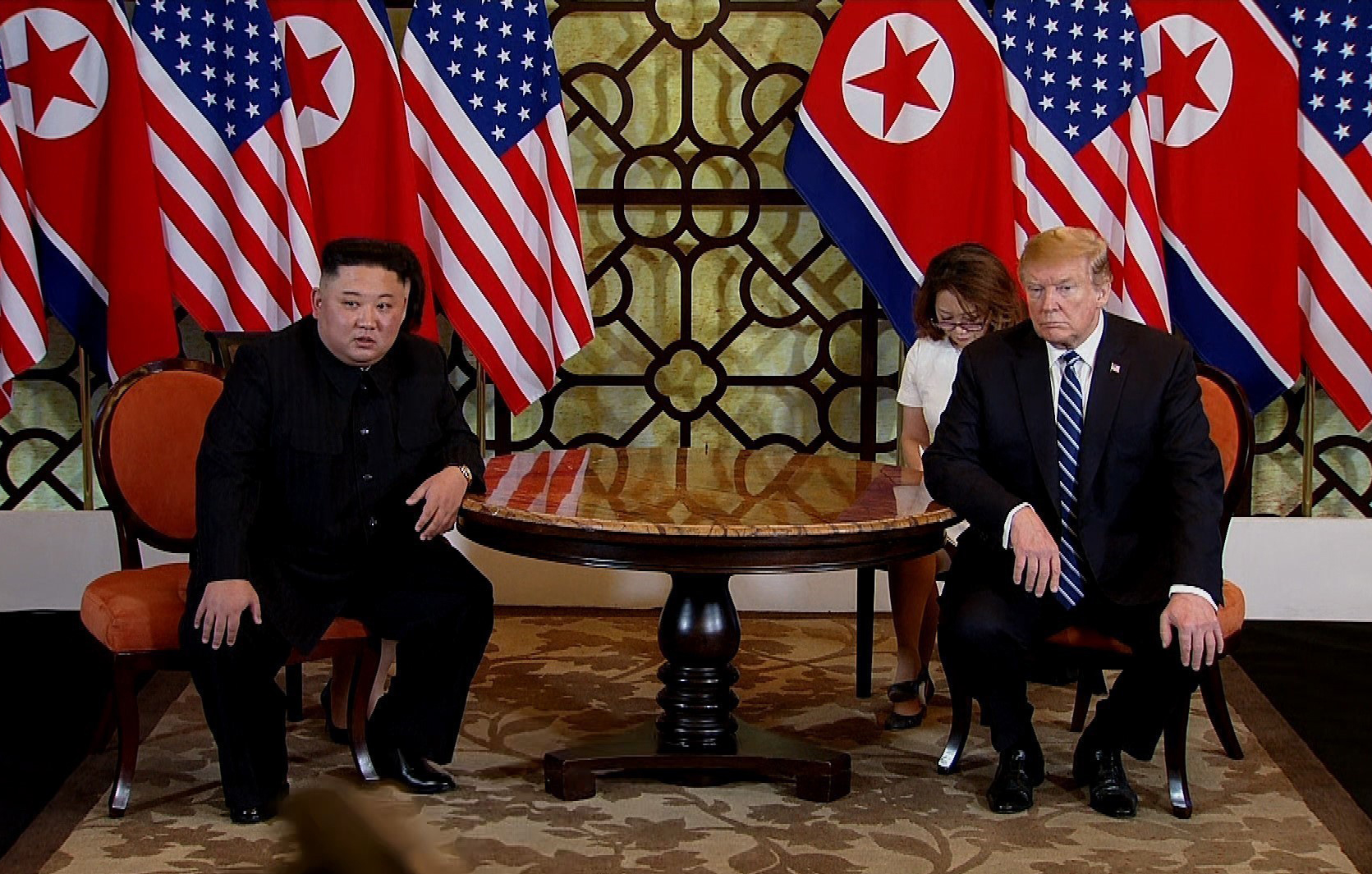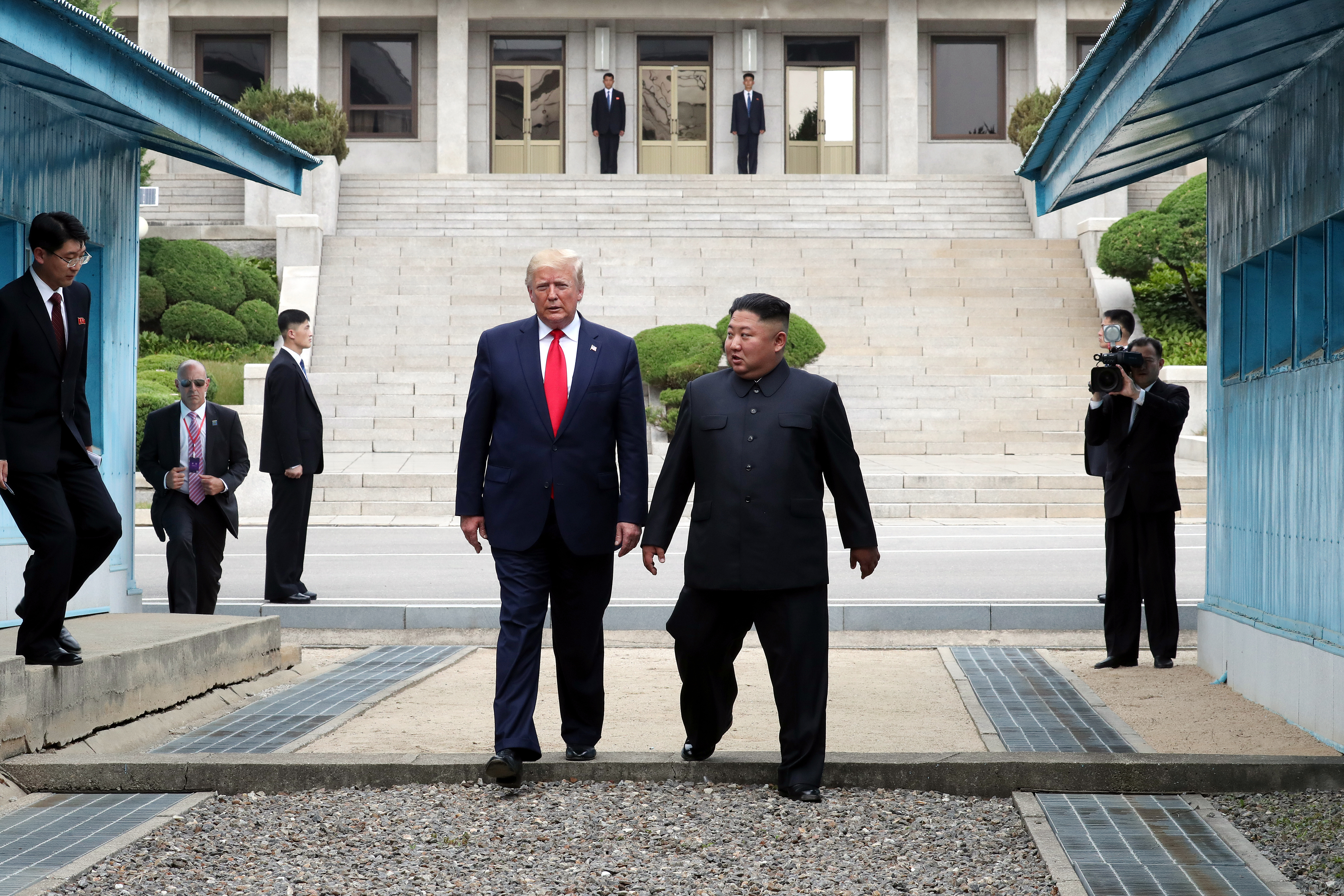Editor’s note: What follows is an excerpt from Doug Wead’s new book “Inside Trump’s White House: The Real Story Of His Presidency” (Here on Amazon). Through exclusive interviews with President Donald Trump, members of the Trump family and key players in the Trump administration, Wead sheds new light on some of the most important events of the Trump presidency, from election night in 2016 to getting the economy back on track to negotiating with North Korean dictator Kim Jong-un.
“It all turned around that week at the United Nations,” President Trump said. “That’s when it happened. I told everybody, ‘The Little Rocket Man is going to cause the total annihilation of his country.’”
On November 30, 2017, President Trump tweeted the message publicly: “The Chinese Envoy, who just returned from North Korea, seems to have had no impact on Little Rocket Man. Hard to believe his people, and the military, put up with living in such horrible conditions. Russia and China condemned the launch.”
At the time, President Trump’s critics, which consisted primarily of the American media, were on all sides of the issue. They complained when the Trump White House sent out feelers to talk to North Korea. He was consorting with an evil dictator, they said. Or he was giving away too much by his apparent willingness to talk. But they were hysterical when Trump began talking tough to Kim Jong-un. “He’s going to start a war.” And yet, at the same time, everyone agreed that it was the status quo that had brought America to the brink. Eleven American presidents had failed to make peace with North Korea. Even some of the most unadventurous State Department bureaucrats were wondering if Donald Trump’s hyperactive motions might force the issue. (RELATED: North Korea Promises To Give U.S. A ‘Christmas Gift’)
“Understand what I am saying to you, Doug,” the president said, “I was saying stuff that you would never say no matter how close you are to the edge. No matter how much dislike there is. You only say this if you are ready to act on it. It was unbelievably close.”

HANOI, VIETNAM – FEBRUARY 28: In this handout photo provided by Vietnam News Agency, U.S. President Donald Trump (R) and North Korean leader Kim Jong-un (L) during their second summit meeting at the Sofitel Legend Metropole hotel on February 28, 2019 in Hanoi, Vietnam. (Photo by Vietnam News Agency/Handout/Getty Images)
The critics were complaining that Trump should watch his language. That he should only talk like that as a last warning, a last effort to shock the enemy into realizing that a war was imminent. Otherwise, you may unintentionally provoke the very war you fear. As early as April 2017, New York Times columnist Nicholas Kristof had written an op-ed speculating on a possible nuclear war with North Korea. Was President Trump now telling me that the United States had actually been there? Had we, indeed, been on the verge of going to war? He would know, because he would have had to make that decision.
“It was unbelievably close.”
“Others were actually discerning this at the time, but their voices were often obscured. Uri Friedman, writing for The Atlantic, claimed that the Trump confidant Lindsey Graham, the Republican senator from South Carolina, “was telling me there was a 70 percent chance of the president launching an all-out war against the Kim regime if North Korea tested another nuclear device.”
Trump’s tough talk to Kim was not a bluff. That was what he was making clear to me during our lunch interview. He was not going to let America be hit by a nuclear missile on his watch. And yet the national media was furious with him, blaming him for the growing escalation. Calling for a more reasonable approach.
When it came to Communist dictators, history tends to favor Trump’s hard line. When John F. Kennedy met with Nikita Khrushchev in Vienna in 1961 he had tried to extend the olive branch, and the Soviet dictator had seen it only as a sign of weakness. Khrushchev ordered nuclear missiles to Cuba, and it brought the world to the brink of a nuclear war.
At the Yalta Conference in 1945, the American president Franklin Roosevelt had tried to be generous to the Soviet dictator Joseph Stalin. The two men carved up post-World War II Europe, as Churchill looked on. It resulted in sending tens of thousands of Eastern Europeans to their deaths in the Gulags. Historians note that Roosevelt had been sick and weakly. He would be dead within two months of the Yalta Conference.
By contrast, critics had been upset by Ronald Reagan’s tough, American cowboy approach. He had called the Soviet Union “the evil empire.” They said he was only provoking them. They were afraid. But most historians now accept that Reagan’s strength helped bring an end to the Cold War and saved the world from nuclear annihilation in his day.
Although a young man, Kim Jong-un had been born into a line of old Communist dictators, in the tradition of Nikita Khrushchev, Pol Pot, and Mao Zedong. He ran concentration camps. He tortured prisoners. A sensational story in a Hong Kong newspaper claimed that he had executed his uncle by feeding him alive to 120 starving dogs. North Korea said he was shot. In February 2017, Kim Jong-un was believed by many to have orchestrated the murder of Kim Jong Nam, his own half brother and possible political rival. It had been an audacious, public assassination at the Kuala Lumpur International Airport. (RELATED: North Korea Won’t Talk To The US Until Trump Reduces Disarmament Demands)
One of the most troubling issues has been the ongoing famines in North Korea. I am a founding board member of Mercy Corps, the relief organization that had taken the lead in distributing food during the 2008 North Korean famine. Our people had been some of the few outsiders allowed into the country. They saw firsthand, on the ground, the devastation. In 2017, even while developing its nuclear arsenal, North Korea was apparently facing famine yet again. The very real concern was that if Kim Jong-un was willing to allow hundreds of thousands of his own people to starve in a famine, why would he have qualms about risking the annihilation of an American city within reach of his missiles? San Francisco, Los Angeles, or Seattle?

PANMUNJOM, SOUTH KOREA – JUNE 30: (SOUTH KOREA OUT): A handout photo provided by Dong-A Ilbo of North Korean leader Kim Jong Un and U.S. President Donald Trump inside the demilitarized zone (DMZ) separating the South and North Korea on June 30, 2019 in Panmunjom, South Korea. (Photo by Handout/Dong-A Ilbo via Getty Images)
Kim Jong-un, who had learned from his father and grandfather, and who came from the old Communist dictator tradition, was apparently a man who respected strength. Communist dictators are predators. And like predators in the wild, they target the weak, not the powerful. Donald Trump’s rhetoric, which rattled the American media, apparently had its impact in Pyongyang.
“Kim said, ‘I have a button on my desk, a red button,’” Trump said, telling the story, “I mean, you can’t misunderstand this. I mean foreign policy people study the tea leaves, but you don’t have to study these words very long to know what they mean.”
“And I said, ‘That’s right and I have a much bigger button than you do and my button works.’ By the way, he knew what that meant. He knew what that meant. We both knew what North Korea could and couldn’t do.”
From this exchange, I got the impression that the North Korean missile program had some limitations and the United States knew what they were. Trump wanted Kim to know what we were aware of what was real and what was only bluster.
“And everybody said, ‘Oh, it is so vicious.’” Trump began to act the part of his panicked critics. “They were all saying this. And for some reason, when I made that speech at the United Nations. Remember? Where I call him ‘Rocket Man’? Where I say ‘He better watch his ass!’ Well, after that, everything changed. It got so incredible. And then they wanted to talk! It is really an amazing thing.”
If the American media was frightened by Trump’s rhetoric, the United Nations got the point. The Security Council voted 15-0 to adopt hard-hitting resolutions against North Korea. Trump was able to bring China and Russia into the effort. Kim was isolated and soon reached out to American to solve the problem.
Incidentally, this whole conversation with President Trump was at times surreal because there was actually a very long, narrow, wooden block on the luncheon table, connected to a cable, and there was a big, fat red button in the middle of it. At one point the president actually pushed the button. It did not launch missiles at North Korea, but it did magically produce a steward with another Diet Coke.
Doug Wead is a New York Times bestselling author and has served as an adviser to two presidents. He also served on the senior staff of the White House.
Excerpted from “INSIDE TRUMP’S WHITE HOUSE” by Doug Wead. (Copyright 2019) Used with permission from Center Street, a division of Hachette Book Group, Inc.


